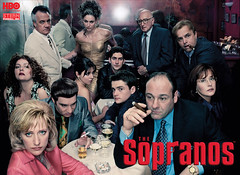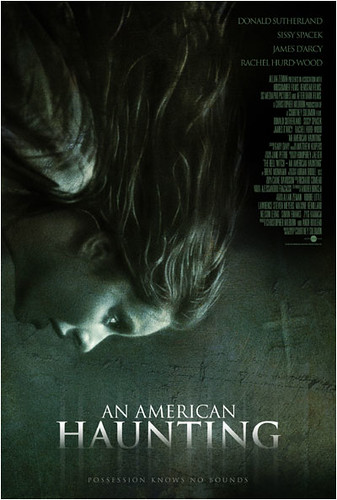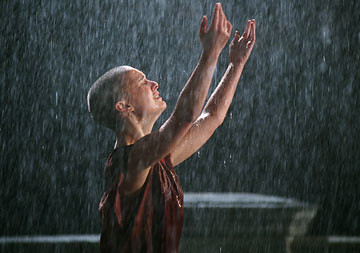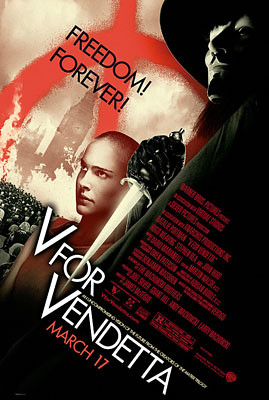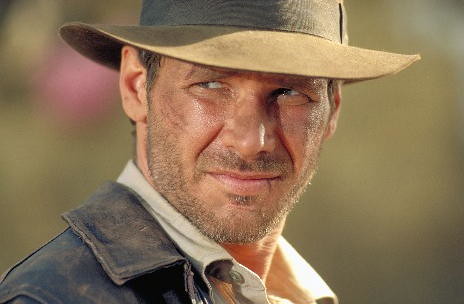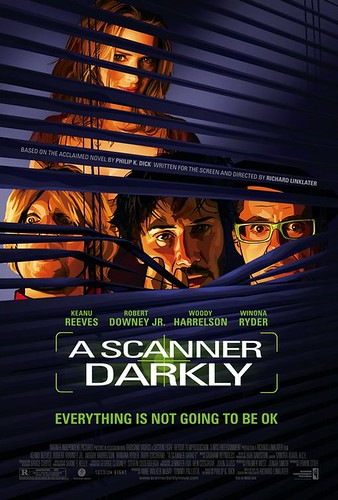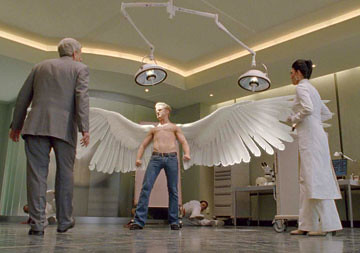It had been years since I had committed a continuous block of time to go see a double feature at the theatre. But this past Friday I decided to buckle down and catch up with the genre fare out there.
UltraViolet whimpered into fourth place at the box office after it was released last weekend, just barely breaking the nine million mark. Ouch. A few weeks ago, I posted my first
thoughts on Ultraviolet after I saw the trailer. I remarked on the similarities to Aeon Flux, another futuristic dystopian sci-fi female hero flick. Now after having seen both films, I can safely say, that yes, they are similar, but more so in their packaging than in their contents, and also that Ultraviolet is the weaker of the two.
The total running time for Ultraviolet is 86 minutes. Without the credits, it clocked in at total of an hour and twenty minutes of actual film footage. That’s shorter than your average Disney animated feature, and I can’t help but wonder just how much of its footage ended up on the proverbial cutting room floor. The opening credit sequence is probably the best part of the movie, featuring a multitude of vibrant comic book art of the character Ultraviolet. (The film was not actually based on a Comic –this was just a gimmick chosen by director, Kurt Wimmer). After the artistic credits, things start to go downhill quickly, as we are plunged into the mother of all expository voiceover monologues. It goes something like this:
“Hi my name is Violet and you may not understand this world that is because several years ago a virus emerged and killed out many in the planet and it created a divide among the population, between the infected and the healthy and whereas before terrorism ruled the ages, now does disease. I was pregnant and had a husband once but then they killed him and infected me and now I am sick too with no baby and I must fight against the evil rulers who wish to kill out those of use who are infected you probably didn’t understand any of this or this world.”Damn skippy we didn’t. The voiceover segment was accompanied by blurry visuals showing men in labcoats, people wearing face masks, and Violet (Milla Jovovich) becoming “infected.” Before my head to stopped spinning from the amount of information that had so ungracefully been shoved into my face, the movie launched into one of its many abrasive action sequences. Violet, or “V”, as her friends call her, is on a mission to retrieve a briefcase (that looks more like a futuristic Fendi purse) which supposedly contains an “antigen” that will wipe out the infected members of society.
V is able to get through the security checkpoints by altering her blood state with some sort of suppressants, and once inside blasts through about two hundred bad guys in order to get out of there alive and with the goods. Jovovich of course is as thin as a rail and has the muscle mass of a child in elementary school, but don’t let that fool you, because she can manifest guns out of thin air and wields a thin square blade with Asian looking cuneiform on it. Exactly how or why V uses the weapons she does is ever explained. One of the big flaws of this movie is that it takes place in a world with many of its own caveats, rules, and histories, but fails to draw the audience in and make it palatable. Even when writer/director Kurt Wimmer does tries to elucidate on certain facts of Violet’s world, he does so with some clunky throw away dialogue.
About thirty minutes into the movie, I begin to suspect something. The “infection” that is rampant in society is actually Vampirism. How do I know this? Well not because it was clear in any way shape or form, that’s for sure. V and her friends do not attack humans or animals, nor do they seem to need blood at all. They can walk around in daylight, and are not afraid of churches, garlic, or crosses. The only way that it’s possible to detect it is by the occasional sporting of the traditional set of fangs by some of the characters, some of the time. Characters do also mention Vampirism in passing, but its all incredibly vague. Exactly what the vampire virus does to humans is uncertain as well. Do these vampires have super human strength? It’s possible, though it’s never laid out that they have more strength than the uninfected folk they battle. They can certainly be killed just as easily. It appears only downside to being infected at all is a shortened life span. Other than that they look just as healthy and strong as can be. V has bouts of “sickness” during the film, but again, it is unclear as to how this is connected to her illness, and if its more so connected to the additives she takes to cover her “blood identity.” What I want to know is, what is the point of having vampires around if they don’t do anything that vampires do?
After Violet gets away with the stolen goods, she gets on her way to deliver the briefcase to her fellow infectees so they can destroy it. Despite a warning from her associate, curiosity gets the best of her and she takes a peek inside the briefcase. V is shocked to find that the briefcase does not contain any test tubes or lab reports, but a young child. (Don’t ask me how its possible for a smallish briefcase to carry a ten year old boy, because I don’t know the answer.) V goes in and confronts the gang of vampires she is working with/for, telling them she was lied to, that the briefcase held a hell of a lot more than an antigen to wipe them out. The head vampire tells her that this “child” has the antigen coursing in his veins, and that he must be eliminated in order to save those like them. V’s harsh, tough exterior falters, and she pleads on behalf of the life of the child. The vampires brush her aside and she leaves. As she walks down the hall we see that she has fooled the vampires, and stashed the kid in a corner! The rest of the movie is dedicated to following Violet and her half pint sidekick named Six, as they run away from the bad guys who are trying to recapture the boy. All sorts of reveals are woven into the haphazard story. Violet brings Six to a friend to have him tested and it turns out he doesn’t have the antigen to the infection in his blood. Then we find out Six is terminally ill. Then we find out Six is actually a test tube baby, a clone of the villainous Daxus who governs the bio-terroristic Garrison state, and is V’s archnemesis. Then we discover he actually contains the Vampiric virus and he will be used to reinfect the population so that Daxus can deepen his controlling grip over the society. None of it makes any sense, but in Ultraviolet, that’s par for the course.
Beyond its story problems, it was impossible to become invested in this story because of its lack of compelling characters. From the moment that Violet pleas with her fellow vampires to spare the life of the innocent child, it was pretty clear to me where all of this was going. Violet, who lost her baby when she became infected, was to reconnect with her maternal instincts as she developed her relationship with Six, fleeing like fugitives from the evils of the dystopia. While not an inherently faulty idea to explore its execution was quite poor. It was difficult to believe that the angular, cranky Violet was anything else than a depressed, embittered killer, and the film’s twenty second attempt at tapping into her past did nothing to shake this mold. I get the feeling that there might have been attempts to deepen Violet’s character, but that these were lost somewhere into the black hole of the editing room. The result of this heavy chopping was not only a two dimensional character, but a complete lack of continuity and coherence. There is a moment in the film where Violet is saved by a male friend, Garth, played by William Fitchner. Violet wakes up in a medical room and Garth says, “Well we didn’t think we could do it, but after four hours of heart surgery you have pulled through!” Frustrated, Violet, asks him why he bothered. Garth then looks at her with puppy dog eyes and says “Isn’t it obvious?” The film then immediately cuts to a scene of the two of them standing outside in the dark, and Garth asking Violet “But why do you keep people out?” Violet gives him some sort of surly answer and rides off into the moonlight. Now I assume here that at some point there was meant to be romantic tension between these two. I don’t necessarily mind that this was cut, but by God, if the filmmaker is going to change something like that, he needs to finesse it a bit better than that… Jovovich is someone who I think is capable of turning in a solid performance, but her portrayal of Violet was a labored endeavor. This was due in large part to the lack of material she had to work with in the script. Ultraviolet, like many films before it, was trying to tell the story of a superhero. In this case the superhero was the remarkably strong, fast, and resilient Violet, a vampire who did not require blood but was doomed to die at an early age. There just wasn’t nearly enough time taken to develop her character, be it by witnessing her past, or seeing her interact with other individuals. Her friend Garth was someone that she interacted with the most in the film, and their interactions were flimsy, fettered enterprises devoid of sincerity. Even the key relationship to the film, that between her and Six, felt empty and ill founded. Six might have been a child prodigy, but his gloomy eyes, lack of dialogue and dullard attitude did not exactly help justify why Violet would passionately fight for his life and connect to him so strongly.
You might think to yourself that the visuals for the futuristic setting of Ultraviolet were its saving grace…but they weren’t. You can’t tell this from watching the trailer, but the whole film was shot with these filters that created a hazy soft look that drove me nuts. They airbrushed Jovovich’s face so much, that at times it looked as though she didn’t even have a nose, just two petite nostrils floating in alabaster. The city where all of this unfolded looked like the cityscape of any U.S. city with a couple of large streamlined structures superimposed on top, resulting in an unappealing lack of congruity. The fight sequences were muddy and blurry, reminiscent of a young children’s ride at an amusement park where you can’t really see what’s going on and things are over before you know it.
Ultraviolet was lacking everything one might look for in a film going experience; story, characters, performance, and visuals. It wasn’t the kind of film that’s bad because it’s mediocre and unexciting, and it wasn’t the kind of film that was bad, but had enjoyable campy value. Ultraviolet was just bad; a sputtering, staggering, beast that should have been put out of its misery before it was released out of the gate.
After a grueling hour and twenty minutes, I was worried about sitting through another potential stinker. Luckily, in comparison, The Hills Have Eyes remake was at the very least, engrossing. THHE was directed by Alexandre Aja, who in 2003, gained notoriety with the French horror film, High Tension, which he wrote and directed and took the Sundance film festival by storm that year. High Tension has a radical twist ending which created a lot of hub bub among film geeks who seemed to be split down the middle about its effectiveness. At twenty seven years old, Aja appears to be one of these young hotshot directors, out to make his mark on the scene. Yet his eagerness to impress ultimately seems to get the better of him in THHE. (whatever the case may be, the man has written and directed two more feature films then I have –so don’t think I’m not munching on some humble pie as I type this blog).
The first half hour or so of the film is very well done. The suspense builds slowly and delicately, forming a house of cards that you know must inevitably tumble. While I haven’t seen the original Wes Craven ’77 version of the film, I’ve heard that the general story is quite similar. The film opens on the Carter family who are on a road trip vacation by way of a Bronco and RV. Ma and Pa Carter are played by the notable Kathleen Quinlan and Ted Levine respectively, are celebrating their twenty fifth wedding anniversary. Oldest daughter Lynne played by Vinessa Shaw, has brought along her husband Doug, (played by Aaron Stanford who also plays Pyro in the X-Men films, but looks completely different) and their one year old baby. The two youngest in the clan are Bobby (Dan Byrd) and Brenda, played by LOST’S Emile de Ravin. From the minute the film starts we get a pretty good idea of the family dynamic without being hit over the head with it. Pa Carter is a staunch conservative patriarch, and also a retired detective, which I thought was a cool occupation for the character, and Ma Carter a maternal, caring bordering on finicky presence. Doug, the son-in-law has plenty of reservations about being on the trip, because of his tensions with the in-laws, and his uptight nature, but wife Brenda does a pretty good job of soothing his frazzled nerves. Bobby is a sweet and loyal but insecure teen, and Brenda’s (de Ravin) character, with probably the worst set-up, is a stereotypical snotty and spoiled teen girl.
Straight off the bat we know who we’re dealing with, and the longer we watch them interact with one another, and handle their surroundings and situation, the more we want to yell at the screen for them to get the hell out of there. When the film starts, the family is pulling into a run down gas station to fuel up and stretch their legs. The owner, a bizarre and wizened old man, tells them about a short cut they can take to cut over to the main high way. At the behest of his impatient family, Pa Carter takes the short cut, and while on the bumpy, dusty, road, blows out all the tires and wrecks the SUV. The family is now stuck in the desert, in the middle of nowhere, with no other cars passing by, no cell phone service, and no signs of civilization to help them. I feel a set of shivers running up my spine just thinking about this as I type. While certainly not a novel concept for a horror movie, Aja is able to capture the isolation and vulnerability of the situation, and make us feel as though this could easily happen to us. He continues to build the tension in the rest of the first act and into the second act with by compounding small unsettling events. Doug and Pa Carter have decided to walk in opposite directions on the dirt road to find help, and Doug happens upon a crater filled with empty deserted cars that have been dumped there. Of course at this point, the audience generally knows that these are the cars of former victims of the mutants which live out in the desert. But Doug doesn’t, and we want to scream and tell him to find a car that starts so that he can pile up his family in it and save them. Back at the RV where the rest of the Carters have been waiting, Bobby has been trying to keep a handle on the family’s two german shepards, Beauty and Beast, who keep running off into the rocky areas of the desert. When Beauty runs away for the second time, Bobby is horrified to discover her body, mutilated and dismembered among the rocks. He is clearly disturbed by this, but at the same time does not want to panic his mother and sisters and so he stays quiet, nervously encouraging them to be cautious. Again, I found myself gritting my teeth and trying to will Bobby to come clean about the dog and evacuate the premesis. Though it is impossible for the family to escape their fate, you can’t help but root for them to do so. Meanwhile Pa Carter has made it back to the eerie gas station by nightfall, where he looks for the owner unsuccessfully, and instead stumbles upon evidence of the evil acts that have been going on in that desert. There is a horrible moment (and by horrible, I mean one invoking a sense of horror, not bad) where we see in Pa Carter’s face that he knows what lays in store for his family who are alone in the dark, back at the camp, and it is gut wrenching.
The first “attack scene” in the film, where the mutants finally descend upon the Carter family, is one of the most upsetting, terrifying, yet well executed scenes I’ve seen in a horror movie in a while. The scenario is structured in such a way that it is painful to watch the family in their panicked behavior, as you will them to get ahold of themselves so that they can save those family members who are still alive and in danger. The thing that struck me about this scene, was that though violent and barbaric in nature, Aja made the camera keep its distance, so that you could not necessarily see the sickest details, but felt the impact nonetheless. While some hardcore horror fans might classify this as “wimping out”, I was impressed by this because I’m the sort of person who doesn’t think it’s necessary to show a fingernail being torn off in front of the camera. Showing the back of the villain, and the scream of the victim, is sufficient and equally upsetting.
Everything up until this horrific climactic moment had me reeled in. I was engaged in the story, invested in the characters, and caught up in the moment. But as the mutants scampered away to their camp and the survivors struggled through the aftermath, things began to feel a little artificial. I think in part, this was due to the fact that two out of the three actors left were probably the weakest of the ensemble to begin with. I really liked Dan Byrd as young Bobby Carter, but Aaron Stanford as Doug seemed ill equipped to carry the rest of the movie (which was essentially what he did), and Emile de Ravin while realistically emotive of the horrendous trauma she had just been through, didn’t have terribly good chemistry with her brother. The scene in the RV immediately following the departure of the heathens felt forced and unrealistic. Ma Carter lay dying on the sofa, and the only one that seemed to give a damn was her son in law Doug. Brenda had just been horribly beaten and assaulted, but nobody seemed particularly concerned with her state.
With the family dynamic reduced to almost nothing, THHE deteriorated into a pretty standard horror genre film. What was alluded to before, was now shown in gory detail, and the serious, urgent verite tone morphed into a fantastical, campy affair. I think I can sort of understand the ideas that Aja might have had for doing this, --perhaps he wanted to show a shift from the gritty reality the characters had been based in to an elusive nightmarish dreamscape. Still, because the shift came in so late in the film, it did not feel organic, and I, myself, would have preferred it to keep its prior energy which felt more tempered and real.
Doug leaves Bobby and Brenda behind to man the camp while he goes in search of the mutant enclave where he believes his baby has been taken. Upon finding it, he discovers a ghost town which was left for dead after severe radiation from government nuclear testing permeated through it. The entire town is a dusty remnant of 50’s model homes filled with decaying mannequins and appliances. While I recognized this as a unique stylized choice on Aja’s part, it didn’t quite work. The mannequins seemed to clash with the miner mutant slaughterhouse and cannibalistic elements, and I understood the paradox of this, the 50’s theme wasn’t executed visually on a large enough scale to have the proper impact.
While at the atomic village Doug encounters some more mutants including an enormous man in a wheelchair, who looked like he stepped off the set of SNL after doing a Conehead sketch. The design for this particular mutant character was overboard with his triple chin and his Igor giggle. It was impossible to really be scared by this figure, and while he had some creepy lines, I wasn’t buying the make-up. In fact I would say one of the large weaknesses of this production was the make-up. None of the mutants looked particularly scary to me; one looked like a goofy Frankenstein, another a hare lipped version of Mackenzie Crook’s character from Pirates of the Caribbean. I felt like I could reach out and touch their puffy prosthetics, --they would have been better off casting some quirky actors and down playing the make-up, though I realize this would have put a whole damper on the mutant theme.
As Doug fights to save his baby, he must defeat one of the head mutants, a battle which evolved into an arduous, never ending fight, with tumbles through breakaway walls, and Doug getting bloodier by the minute. It is at this point that the film enters true gorefest territory with close-ups of fingers being lopped off, and pick-axes plunging into foreheads. Some people get a kick out of this sort of thing. I do not, and I was much more entertained when Aja relied on his mastery of suspense and tension.
In an incredibly bizarre moment of “meanwhile, back at the ranch…”, siblings Bobby and Brenda are once again thrown into terror when they realize that the body of their mother has vanished. When Bobby goes to investigate, he discovers a mutant eating the corpses’ remains, in the old gruesome red spaghetti guts fashion. I was more annoyed at this development than I was horrified, because the gut eating was the sort of old hat I had seen in countless Zombie flicks and b-movie horror fare. Beyond that was the inexplicable discrepancy in the appearance of this particular mutant, who did not look anything like the others, and did not appear to have any sort of deformity. With his long hair and trench coat he looked more like a renegade back up member of ZZ top than anything else. The non-mutated mutant chases Bobby back to the camp where he and his sister have set up a booby trap and the two blow the mutant and the truck and RV up to the sky. Right at this moment Doug appears with the surviving dog and baby in a comical hero stance through the licks of fire with over the top desperado music playing in the background.
When I say that Aja gets a bit ahead of himself, I believe that he is trying to prove that he can do it all, within the confines of this one picture. Aja, who worked on the script for THHE remake as well, also tried to infuse his two cents of political commentary within the film. One of his primary alterations to the story was to change the villains, from uncivilized homicidal maniacs who happened to live in the desert, to deformed individuals who were descended from people who had been exposed to massive radiation from the U.S. government’s atomic testing in the area. When he is conversing with Doug the Conehead mutant has a line which states that Doug and his folk created his people, and now they are suffering for it. I found this to be a thinly veiled commentary on the U.S. government having created situations in the world, and then having these “mutants” or “monsters” come back to haunt them or their people , i.e. terrorism, the situation in the Middle East. Again, while I commend the fact that Aja was attempting to inject some politics into a horror flick, it felt more tacked on than anything else. Aja wanted his American feature debut to be part suspense, part gross out horror, part social commentary, and part character study. I think the end result was a film that only succeeded in parts of these areas part of the time. I was completely sold on the film for the first half, but it lost me a bit in the second half. I was still committed to finding out the fate of the characters, but I thought it shifted gears a little clumsily, and lost the steady pacing of the first half. All in all it was one of the more absorbing horror remakes in the past couple years. More compelling I’d say than The Amityville Horror and The House of Wax. I only wished it hadn’t puttered out the way it did.
